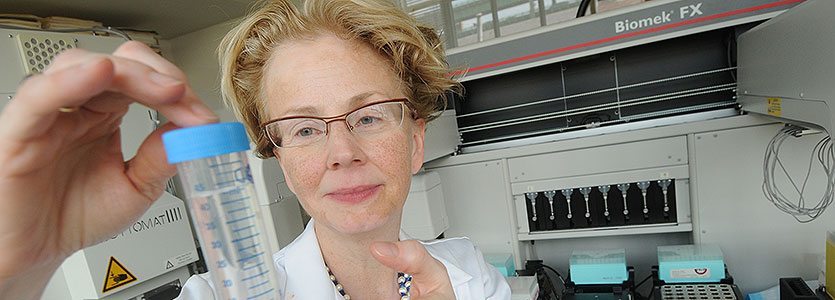 Published 2 weeks ago by Albert McKeon in Diabetes, Donor Recognition, and Medical Research. Click here to read original article.
Published 2 weeks ago by Albert McKeon in Diabetes, Donor Recognition, and Medical Research. Click here to read original article.
After nearly 20 years of research, Massachusetts General Hospital researcher Denise Faustman, MD, PhD, has made a promising advance in her quest to cure type 1 diabetes.
Her team recently passed a major threshold by receiving FDA clearance to test a large group of long-term diabetics with an old tuberculosis vaccine that could also combat type 1 diabetes. The phase 2 trial of the bacillus Calmette-Guérin (BCG) vaccine was announced last month at an American Diabetes Association conference in Boston, an exciting next step in Dr. Faustman’s pursuit of a therapy to reverse the disease.
While thrilled about receiving the FDA’s blessing, Dr. Faustman and her staff didn’t celebrate for long. They’re already accepting applications for patients who want to participate in the five-year trial that starts this summer.
We’re in full action mode. The phones are ringing off the hook,” Dr. Faustman says. As many as 100,000 diabetics are expected to volunteer for the clinical trial, but the MGH Immunobiology Laboratory will winnow the number of participants to 150 adults, with some receiving BCG and others taking a placebo.
Old Vaccine, New Promise
The FDA approved the phase 2 trial essentially by certifying MGH’s use of BCG that will be produced by the Japanese government. Academics usually don’t have to look around the world to find a drug supply chain, Dr. Faustman says, but her lab – in collaboration with the Bill & Melinda Gates Foundation and the World Health Organization – searched as far as Japan because it couldn’t land enough BCG from a U.S. drug manufacturer.
BCG was first used as a vaccine against tuberculosis, and it more recently targeted bladder cancer. Dr. Faustman started experimenting with the vaccine in the early 1990s. She was interested in how BCG triggers the immune system to make a protein that kills the abnormal T-cells which hinder the pancreas’ ability to produce insulin.
Her recent advance might not have happened without the insistence and generosity of former Chrysler CEO Lee Iacocca. After losing his wife, Mary, to complications from diabetes, Iacocca’s charitable foundation began supporting Dr. Faustman’s research, and in 1999 he urged her to expand her testing to mice, with the promise of continued funding.
Deserving Diabetes Patients
“We cured a late-stage diabetic mouse and saw pancreatic regeneration. No one had seen that before,” Dr. Faustman recalls. That led to a small phase 1 study in people to see if BCG could destroy the bad T-cells and prompt the good ones to produce a small amount of insulin. That phase succeeded, leading to this next stage: a longer trial on a larger number of people who have had type 1 diabetes for years.
“All type 1 diabetes intervention trials have been only in new onset cases, people only a year out from diagnosis,” Faustman says. Her team’s phase 2 trial will be “remarkable because we’re picking people who are the most deserving to receive this novel therapy. These are the people who’ve had diabetes for years. If there’s a way to see if it works, you have to go for the people who’ve had it the longest.”
Dr. Faustman’s team will administer, four weeks apart, two injections of BCG or a placebo, on top of annual injections over the remaining four years. Trial participants – ages 18 to 60 – need to have low but detectable levels of insulin secretion from the pancreas to qualify for testing. If the trial succeeds, Dr. Faustman’s team will conduct a third trial with a larger group of people.
Extremely Broad Support
“We’ve worked on this for 20 years,” Dr. Faustman says. “We understand the pathway and mechanism of the disease…the tools are in hand. We’ve done the homework.”
The Iacocca Family Foundation and many individual donors contributed to the more than $19 million that has been raised to finance the phase 2 trial; another $6 million is still needed. Dr. Faustman appreciates the support she’s received over the years and hopes donors recognize the importance of moving testing forward.
“We have kids raising money with lemonade stands and other people having large fundraisers. We’ve benefitted from small and big philanthropic programs, from the U.S. and Canada. We’ve had extremely broad support and we’ve been fortunate.”




